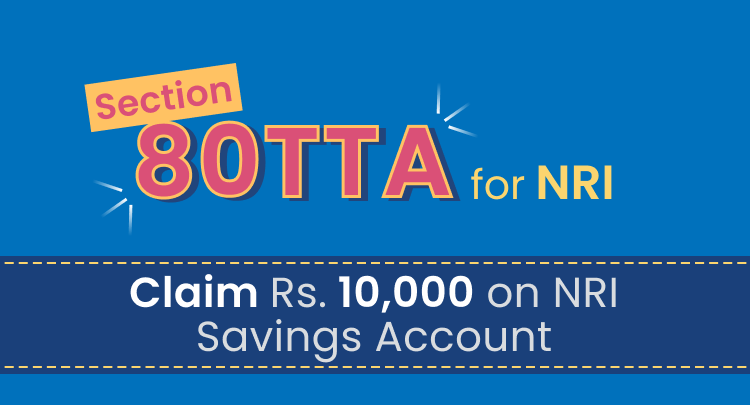Did you know that you can claim a deduction on the interest earned on your NRI Savings Bank Account up to a maximum of Rs.10,000 just like Resident Indians under section 80TTA? The bank accounts for Resident Indians and NRIs are different. We have already understood the concept of Non-Residents and their bank Accounts and know that an NRI can only have a Non-Resident External (NRE) or a Non-Resident Ordinary (NRO) Savings Account in India. The third type, Foreign Currency Non-Resident Bank Account [FCNR(B)] is a deposit only account. The interest that you earn on an NRE Savings Account is tax-free in India. So, the only savings account we are left with is the NRO Savings Account.

One thing to focus on here is that this section 80TTA is specific to the NRO Savings Bank Account and not the NRO Fixed Deposit. In this article, we will focus on the aspect that is unknown to most NRIs about how they can claim Rs.10,000/- on the interest earned on the NRO Savings Bank Account under section 80TTA. Let’s understand what is this particular section 80TTA and how it is beneficial for our NRI friends all around the globe.
Section 80TTA for NRI
Making it clear once again, this deduction of Rs.10,000 under section 80TTA is only applicable to the interest earned on the NRO Savings Account for an NRI. For example, if you have 2 to 3 lakhs in your NRO saving account which resulted in an interest of around Rs.12,000 to Rs.15,000 on a 4% annual rate, then up to Rs.10,000 can be claimed as a deduction under section 80TTA.
Highlights
- Available from 2012-13
- Section 80TTA is applicable for both Resident Indians and NRIs
- For NRI, section 80TTA is only available for NRO Savings Account
- The tax deduction is only available for NRO savings account and not NRO Fixed Deposits which is taxed at 30% along with surcharge and cess in the form of TDS
- The tax benefit is only applicable to individuals and Hindu United Family (HUF) and not for firms or companies
- You can claim this deduction if your savings account is with a bank (both public and private sector), a co-operative society, and a post office.
The Non-Resident Ordinary (NRO) Bank Account
The NRO account is opened for the purpose of maintaining the income earned from India such as income from rent, pension, etc. The repatriation of the money in the account can be done up to a maximum of 1 million USD per financial year. Note: 30% tax + surcharge + education cess will be deducted at the source of interest earned in India.
Here are the highlights of NRO Account:
| Factors to consider | Non Resident Ordinary (NRO) Account |
|---|---|
| Purpose | For income earned from India (pension, rent etc.) |
| Currency | INR |
| Tenure of Fixed Deposits | 7 days to 10 years |
| Interest on Fixed Deposits | Up to 7.25%* |
| Joint Account Holding | Both NRIs and Resident Indians |
| Repatriation(transfer of money from Indian bank account to foreign bank account) | Up to a maximum of 1 million USD per financial year |
| Tax Deductions | Tax on Interest earned (not on principal amount): 30% tax + surcharge + education cess will be deducted at the source of interest earned in India |
How to save tax under section 80TTA
Without a doubt, NRI Income Tax is a very complex subject and expert advisory is often necessary to avoid paying extra. If you want a detailed taxation advisory from experts at SBNRI, contact us using the button below and we will help you file your taxes in the most convenient way with maximum savings. Visit our blog and youtube channel for more details.
Section 80TTA for NRI: FAQs
For an NRI, income earned and received outside India, and money remitted back is not taxable. But if your income in India (by way of interest from savings account/fixed deposits or rental income) exceeds Rs. 2,50,000, then it is taxable in India. NRI or not, every individual must file a tax return if their income exceeds Rs 2,50,000. But note that NRIs are only taxed for income earned/collected in India.
To prove NRI status, one has to submit any of the following documents as proof of residence abroad:
1) Employment Details
2) Student Status
3) Dependent Visa Status, or
4) A copy of Resident Permit of the country where the individual is residing
Note: The proof needs to be attested either by the Indian Embassy, Notary or an Indian Bank with an overseas branch.
NRI or not, every individual must file a tax return if their income exceeds Rs 2,50,000. But note that NRIs are only taxed for income earned/collected in India.
Deduction under Section 80TTA is not allowed on interest earned on time deposits such as fixed deposits or recurring deposits. The maximum deduction allowed under Section 80TTA is limited to Rs 10,000.
Relief under Section 80TTA is limited to savings accounts while Section 80TTB covers both savings accounts and fixed deposit accounts. Relief under Section 80TTA available to individuals and HUF. Section 80TTB provides relief to only individuals. Section 80TTB provides relief to only resident senior citizens.



